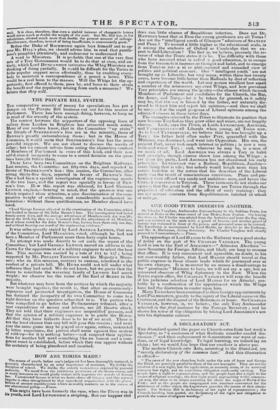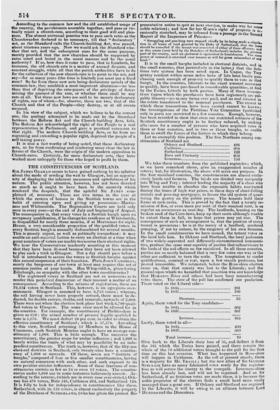A DECLARATORY ACT.
THE Standard quoted the paper on Church-rates from last week's Spectator, as "a specimen of' what Radicals consider candid dis- cussion ;" and then codeavoured to demonstrate our want of can- dour, or of legal knowledge. To legal learning, we indeed lay no claim ; but we would fain hope that our candour is above par.
The modern Church-rate Acts, according to the Standard, are "merely declaratory of the common law." And this illustration is offered- " The Cases of the new churches, built under the acts of Anne and George the Third, are precisely parallel to those of the new boroughs. They are rout the creation of a new right, but the application, as necessity arose, of an universal common law tight, and its correlative obligation confessedly existing. The people have a right to represtutatiou, and the people have also a right to the ine,ans of religious worship ; the first right nearly approaching to the c,moinmori- isv sera, the other hi its origin ascending far above the reign of Rielta,d the First; and as the people ale congregated into DUIllberli convenient for the attai lllll eta of either object, the Legislature provides the means of that attain- ment. Tile Reform Bill is declaratory of the right of representation ; the chureh•lniintins Acts quoted, are declaratory of the right and obligation to provide the means of religions worship." According to the common law and the old established usage of the country, the parishioners assemble together, and pass or vir- tually reject a church-rate, according to their good will and plea- sure. The almost universal practice was to pass such rates as the Churchwarden declared to be necessary, till that " declaratory " act, as the Standard calls the Church-building Act, was passed, about nineteen years ago. Now we would ask the Standard whe- ther that act, and the subsequent ones for the same purpose, merely provided that the new churches should be supported by rates voted and levied in the usual manner and by the usual authority ? If so, how does it come to pass, that in Lambeth, for instance, the old church-rate is a matter of annual dispute, and constant struggle, while all that the parish authorities have to do for the collection of the new church-rate is to point to the act, and say—for so many years (the time is limited) you must pay a fixed sum? So far from these new acts being declaratory merely of the common-law, they establish a most important alteration—no less than that of depriving the rate-payers of the privilege of deter- mining the amount of the rate, or whether there shall be any rate at all. Yet these new laws are said to be merely declaratory of rights, one of which—for, observe, there are two, that of the Church and that of the People—they destroy, or at all events suspend.
In his view of the subject, which we believe to be the correct one, the analogy attempted to be made out by the Standard between the Reform Act and the Church-building Acts, fails. The Reform Act acknowledged the right of the People to a real representation in Parliament, and gave a practical extension to that right. The modern Church-building Acts, so far from re- cognizing and extending a popular right, deprived the people of a self-taxing power.
It is also a fact worthy of being noted, that these declaratory acts, so far from confirming and rendering more clear the law in favour of the Church, were the origin of the modern opposition to Church-rates. Certainly, for mere declaratory acts, they have worked most unhappily for those who hoped to profit by them.



























 Previous page
Previous page